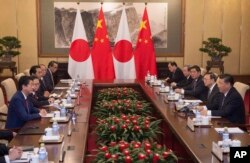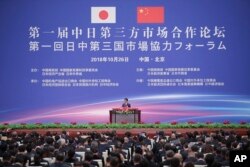Japan and China took an important step Friday to elevate their relationship, marking what Japanese Prime Minister Shinzo Abe called a historic turning point in ties between the two Asian neighbors.
During meetings, the two countries signed a $30 billion currency swap aimed at facilitating money exchanges for businesses. They also agreed on a range of security, economic and diplomatic agreements, while private businesses sealed dozens of deals.
Tensions over territorial disputes in the East China Sea have long been a key source of friction between the two countries. Relations took a nosedive in 2012 when Tokyo nationalized the uninhabited Senkaku islands.
China claims the Japanese controlled islets are part of its territory and the move sparked a wave of protests across the country and anti-Japanese sentiment. Japanese investment in the country shrank as political relations chilled for a period and only started to truly recover until last year.
During meetings with Chinese Premier Li Keqiang, Prime Minister Abe stressed that without stability in the East China Sea there would not be a true improvement in the relationship.
Port calls
To get to that point, the two have agreed to push forward with visits and exchanges between their defense ministers and to host reciprocal port calls. They also agreed to strengthen cooperation to work towards joint gas development in the East China Sea, but failed to reach a deal as some had expected.
China is unlikely to change its position on territorial claims, but during Friday's meetings, Li expressed Beijing's willingness to work together with Tokyo to address regional security issues and support efforts toward dialogue and improving relations with North Korea.
"China would like to meet Japan halfway, and work with the Japanese side to return it to its normal track, and maintain the stable, sustained and healthy development of bilateral relations and achieve new improvements," Li said.
Big deals
One key step forward was an agreement between Japan and China to work together in third countries on infrastructure, transport, health care and finance projects and to avoid what Li called "cut-throat competition." Japan has stressed that such cooperation can only happen when projects meet international standards.
In other words, projects need to be open, transparent, make good business sense and not burden third countries with unreasonable amounts of debt.
On Friday, the two announced more than 50 deals between private businesses. Premier Li said the deals totaled $18 billion and were a reflection of the "bright prospects" for cooperation between the two countries, according to Reuters.
However, when asked for more specifics on the deals, Abe's spokesman Takeshi Osuga said he had "no idea how that number was calculated."
Perhaps one of the most important shifts in the ties was Japan's announcement that it was officially ending 40 years of development aid to China, and that from this point forward Tokyo and Beijing would look to work together on development aid and pursue a new type of relationship.
"With the development of China, the time has come for China and Japan to contribute to the world. I am very happy that today I am able to be here with Premier Li and everyone for this historic turning point," Abe said.
Human rights raised
Prime Minister Abe also raised the issue of human rights during meetings with Premier Li on Friday, and stressed to Chinese officials that the international community is carefully watching the situation in China.
It was unclear, what specific rights issues Abe raised. When asked whether that included China's crackdown on rights lawyers or its arbitrary detention of perhaps as many as one million ethnic Uighurs and other Muslim ethnic minorities in western Xinjiang, Abe's spokesman Osuga declined to comment.
The United Nations will carry out its Universal Periodic Review of China's human rights situation early next month.
Osuga did note that universal values and maritime security were important principles of Japan's engagement with China.
"Important universal issues including for example human rights and freedom of the press, those important principles and our position on those issues will not be compromised," Osuga said.
He added that Japan sees its bilateral cooperation with China as an opportunity to forward progress in those areas and engage in constructive frank discussions.
After a full day of meetings with business leaders and Li, Prime Minister Abe met with Chinese President Xi Jinping later on Friday. The two also dined together. Abe's visit to China is hoped to pave the way for a reciprocal visit by Xi to Japan in the near future.
Abe returns to Tokyo on Saturday. Just one day later, on Sunday, he will begin a two-day summit with Indian Prime Minister Narendra Modi.







